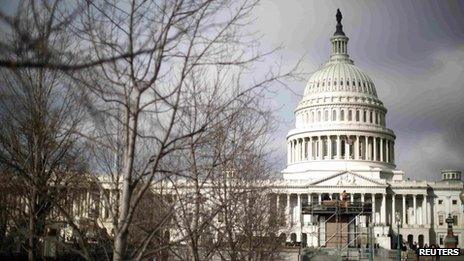Sequester budget cuts: America's grim fairy tale
- Published
- comments

Who is to blame, the president or the Congress?
US President Barack Obama has said: "The greatest nation on Earth can't keep on conducting its business drifting from one crisis to the next."
But it does. How did it get to this point?
It makes me think of those gruesome and rather unbelievable fairy tales.
Two brothers, the sort of brothers who hate each other very much, together own a farm and an estate.
They agree the land no longer flows with as much milk and honey as it once did, so they agree something must be done.
But they argue furiously about what that should be. One wants to raise rents on the richer tenants and spend the gold on gleaming new farm buildings and prize cattle.
The other brother grumbles that all these fancy projects caused the decline of milk and honey in the first place, along with free geese given to the growing band of widows, orphans and retired retainers.
They cannot agree. They must agree. So they make a dreadful pact. If by midnight in a year's time they have not found common ground, they will both make a horrible sacrifice.
The infant son of one brother will have an arm chopped off, while the other's baby daughter will forfeit a leg. To make sure this awful promise is kept the children are sent to live with a wicked witch in the woods.
Kicking the can
This, of course, is where such tales are rather unconvincing.
For no-one would really take that sort of risk in real life. Not unless they were American politicians.

President Obama has urged American voters to tell their congressmen they must make a deal
In our story, at midnight the brothers delayed the deal for eight more moons. But even granted another two months' grace after that they are now at the kitchen table, backs to each other, arms folded, only turning around to shout the occasional insult, apparently not over-worried by the fate of their children.
The real world pact, external was the 2011 Budget Control Act, external, voted for by Congress.
Many Republicans say, external the idea for the "sequester" budget cuts was President Obama's in the first place. The White House rejects that, external.
Whoever came up with the idea, the 2011 law meant failure to agree would cut both cherished Democratic programmes that helped the poor and defence spending beloved of Republicans.
Agreement should have come through the bipartisan Simpson-Bowles committee, which did indeed come up with a truly bipartisan plan, external.
It was so bipartisan that partisan members of the committee - and the president - refused to back it, external.
After that, it was up to Congress to find agreement. That was never going to happen before the election.
These cuts were one half of the "fiscal cliff" that loomed at the end of last year.
Congress struck a new year's deal that averted automatic taxes rises, but merely kicked this particular can down the road until 1 March 2013. On Friday we reach that can.
Government by crisis
Could they give it another kick? Yes, but Republicans would see that as just putting the problem off and giving the president a limited victory.
Some conservatives think at least this plan does make cuts, even if they are not the ones they like best.
It is now a question of who blinks first.
The president is highlighting the dire consequences - some accuse him of scaremongering - and is urging people to press Congress to make a deal.
He knows the plan is already causing splits among Republicans.
His long term strategy must be to define the Republican brand, already damaged and defeated, as the cause of dysfunctional government.
There is still more of this to come - the budget funding the government runs out at the end of March.
There is seemingly no end to this toxic tale of cruel dismemberment and government by crisis.
- Published26 February 2013

- Published26 February 2013